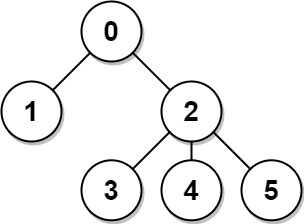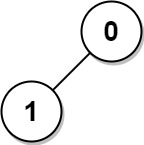Sum of Distances in Tree
Problem
There is an undirected connected tree with nodes labeled from to and edges.
You are given the integer and the array edges where indicates that there is an edge between nodes and in the tree.
Return an array of length where is the sum of the distances between the node in the tree and all other nodes.
Example

Input: n = 6, edges = [[0,1],[0,2],[2,3],[2,4],[2,5]]
Output: [8,12,6,10,10,10]
Explanation: The tree is shown above.
We can see that dist(0,1) + dist(0,2) + dist(0,3) + dist(0,4) + dist(0,5)
equals 1 + 1 + 2 + 2 + 2 = 8.
Hence, answer[0] = 8, and so on.

Input: n = 1, edges = []
Output: [0]

Input: n = 2, edges = [[1,0]]
Output: [1,1]
Constraints
Submit your solution at here
Solution
Intuition
The first naive solution came to my mind is DFS each node and count. This brute force will result in and obviously TLE.
But what if we have already have the answer for node , can we calculate answer for all children of fast?
Approach
Actually we can do it, let's DFS twice:
- First pass, for each node calculate sum of all path to all children of
- After first pass, the value on the root node already is the answer
- Second pass, for each node with parent that has already has answer, calculate sum of all path to the other node that on the other side (is not children) of
Complexity
- Time complexity:
- Space complexity:
Code
The implementation is heavy, looks daunting but actually not too complex 😀
class Solution {
public:
vector<int> parent;
vector<int> childCount;
vector<vector<int>> children;
vector<vector<int>> adj;
void buildTree(vector<vector<int>>& adj) {
vector<bool> vis(parent.size(), false);
queue<int> q;
q.push(0);
vis[0] = true;
while(!q.empty()) {
auto u = q.front();
q.pop();
for(auto v: adj[u]) {
if(vis[v]) {
continue;
}
vis[v] = true;
q.push(v);
parent[v] = u;
children[u].push_back(v);
}
}
}
void buildDistBottomUp(int root, vector<int>& score) {
int p = parent[root];
if(p != -1) {
int n = parent.size();
int otherSideScore = score[p] - score[root] - childCount[root] - 1;
int otherCount = n - childCount[root] - 1;
//cout<<"build "<<root<<" current score = "<<dist[root]<<", other side score = "<<otherSideScore<<" other count = "<<otherCount<<endl;
score[root] += otherSideScore + otherCount;
}
for(auto child: children[root]) {
buildDistBottomUp(child, score);
}
}
void buildDistTopDown(int root, vector<int>& score) {
for(auto child: children[root]) {
buildDistTopDown(child, score);
score[root] += score[child]+childCount[child]+1;
}
}
void countChildren(int root) {
for(auto child: children[root]) {
countChildren(child);
childCount[root] += childCount[child]+1;
}
}
vector<int> sumOfDistancesInTree(int n, vector<vector<int>>& edges) {
parent.resize(n,-1);
childCount.resize(n, 0);
children.resize(n);
adj.resize(n);
for(auto e: edges) {
adj[e[0]].push_back(e[1]);
adj[e[1]].push_back(e[0]);
}
vector<int> ret(n, 0);
buildTree(adj);
countChildren(0);
buildDistTopDown(0, ret);
buildDistBottomUp(0, ret);
return ret;
}
};